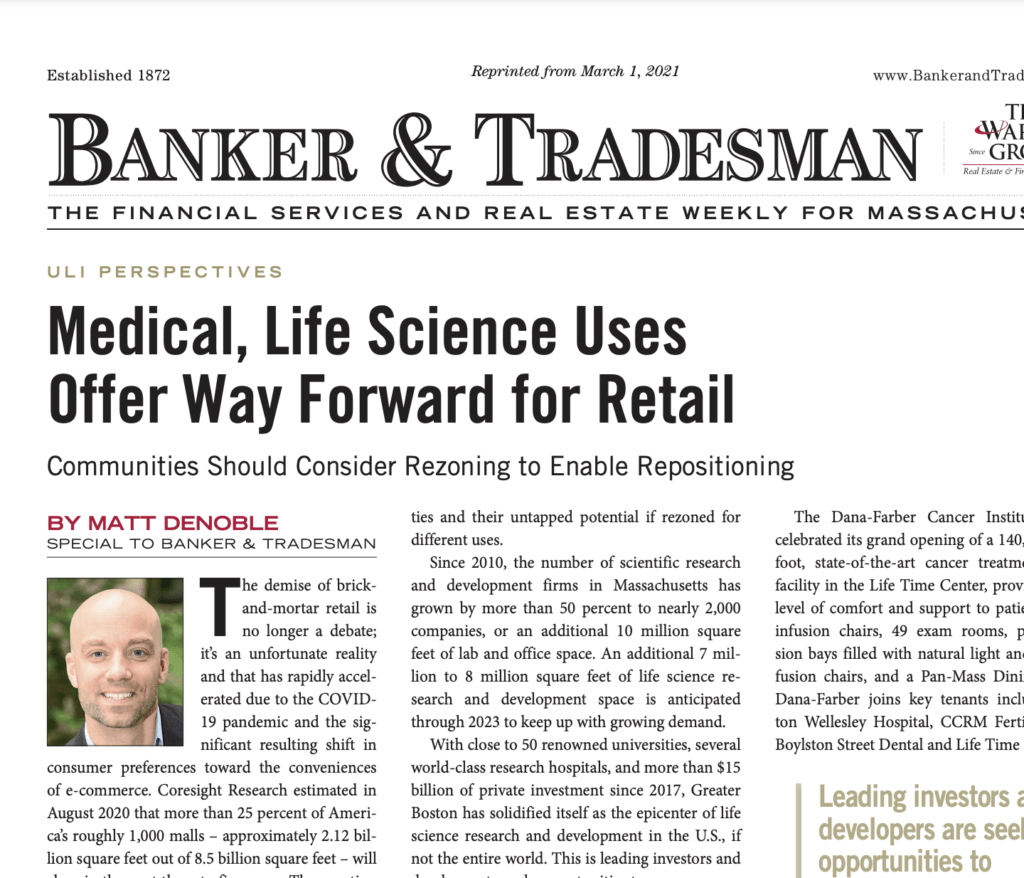News

Medical, Life Science Uses Offer Way Forward for Retail
BOSTON, MA – March 1, 2021
Communities Should Consider Rezoning to Enable Repositioning
By Matt DeNoble | Special to Banker & Tradesman
The demise of brick-and-mortar retail is no longer a debate; it’s an unfortunate reality and that has rapidly accelerated due to the COVID-19 pandemic and the significant resulting shift in consumer preferences toward the conveniences of e-commerce. Coresight Research estimated in August 2020 that more than 25 percent of America’s roughly 1,000 malls – approximately 2.12 billion square feet out of 8.5 billion square feet – will close in the next three to five years. The question top of mind for investors, developers, and municipalities is: How can struggling or shuttered retail centers be transformed to fit within current market conditions and serve the needs of surrounding communities?
While many malls and shopping centers across the U.S. may no longer support the traditional needs of retail consumers, these properties – specifically class B and class C retail centers – are often located near public transit and typically offer expansive footprints with ample parking, making them strong candidates for revitalization through rezoning for office, industrial, medical, multifamily housing, or mixed–used communities.
Although abandoned or struggling retail centers can present unique redevelopment opportunities, it is imperative that investors and developers work closely with municipalities to understand the economic and social importance of these properties to the surrounding communities and their untapped potential if rezoned for different uses.
Since 2010, the number of scientific research and development firms in Massachusetts has grown by more than 50 percent to nearly 2,000 companies, or an additional 10 million square feet of lab and office space. An additional 7 million to 8 million square feet of life science research and development space is anticipated through 2023 to keep up with growing demand.
With close to 50 renowned universities, several world-class research hospitals, and more than $15 billion of private investment since 2017, Greater Boston has solidified itself as the epicenter of life science research and development in the U.S., if not the entire world. This is leading investors and developers to seek opportunities to repurpose existing or develop new facilities in both urban and suburban core markets.
Newton Mall Offers Example
An affiliate of The Bulfinch Companies, Inc. acquired the failing Atrium Mall – a distressed asset in a core suburban market – in the Chestnut Hill section of affluent Newton, a short drive from Boston’s Longwood Medical Area. Bulfinch’s vision was to reposition the nearly vacant retail center as a hub for health, wellness and medicine in the region.
Bulfinch successfully transformed the former mall into a premier health and wellness destination rebranded as Life Time Center. The revitalized property is a 290,000–square–foot, one-of-a kind, LEED Gold-certified healthcare facility with large, efficient floor plates, a sunlit atrium, a 1,000-plus-car parking garage and a private Life Time Center shuttle to the MBTA’s Chestnut Hill Green Line station.
The Dana-Farber Cancer Institute recently celebrated its grand opening of a 140,000–square–foot, state-of-the-art cancer treatment hospital facility in the Life Time Center, providing a high level of comfort and support to patients with 61 infusion chairs, 49 exam rooms, private infusion bays filled with natural light and heated infusion chairs, and a Pan-Mass Dining Pavilion. Dana-Farber joins key tenants including Newton Wellesley Hospital, CCRM Fertility Boston, Boylston Street Dental and Life Time Fitness.
As demand for more life science lab and office space in greater Boston continues, the trend of repurposing failing retail assets into life science and medical buildings will remain strong. Few regions are better positioned to capitalize on the explosion of life sciences research and development, and opportunities for investors and developers will spill beyond traditional innovation hubs like Kendall Square to suburban core markets including Newton-Needham, Watertown and Burlington.
